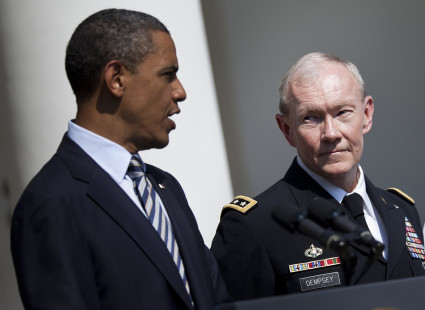PHOTO: President Obama with the head of the Joint Chiefs of Staff, General Martin Dempsey
The Obama Administration’s campaign in Iraq and Syria against the Islamic State is not going very well — at least for “military officers and civilian Pentagon leaders” who have complained to The Daily Beast.
The unnamed officials complain of “micromanagement” from the system led by National Security Adviser Susan Rice, with “sudden and frequent meetings” of the National Security Council and the Principals Committee — senior officials from the State Department, Defense, and intelligence community — and constant requests for paperwork slowing operations.
At the strategic level, the sources put the fundamental objection that the Administration has refused to work with the Syrian insurgency against the Islamic State, preferring a creation of a 5,000-fighter force which will take many months — if it happens at all.
Military Hates White House ‘Micromanagement’ of ISIS War
Josh Rogin and Eli Lake
Top military leaders in the Pentagon and in the field are growing increasingly frustrated by the tight constraints the White House has placed on the plans to fight ISIS and train a new Syrian rebel army.
As the American-led battle against ISIS stretches into its fourth month, the generals and Pentagon officials leading the air campaign and preparing to train Syrian rebels are working under strict White House orders to keep the war contained within policy limits. The National Security Council has given precise instructions on which rebels can be engaged, who can be trained, and what exactly those fighters will do when they return to Syria. Most of the rebels to be trained by the U.S. will never be sent to fight against ISIS.
Making matters worse, military officers and civilian Pentagon leaders tell The Daily Beast, is the ISIS war’s decision-making process, run by National Security Adviser Susan Rice. It’s been manic and obsessed with the tiniest of details. Officials talk of sudden and frequent meetings of the National Security Council and the so-called Principals Committee of top defense, intelligence, and foreign policy officials (an NSC and three PCs in one week this month); a barrage of questions from the NSC to the agencies that create mountains of paperwork for overworked staffers; and NSC insistence on deciding minor issues even at the operational level.
“We are getting a lot of micromanagement from the White House. Basic decisions that should take hours are taking days sometimes,” one senior defense official told The Daily Beast.
Other gripes among the top Pentagon and military brass are about the White House’s decision not to work with what’s left of the existing Syrian moderate opposition on the ground, which prevents intelligence sharing on fighting ISIS and prevents the military from using trained fighters to build the new rebel army that President Obama has said is needed to push Syrian President Bashar al-Assad into a political negotiation to end the conflict.
The New York Times reported Wednesday that Defense Secretary Chuck Hagel himself is among the critics of Obama’s strategy in Syria. Hagel wrote a memo last week to Rice warning that Obama’s Syria strategy was unclear about U.S. intentions with respect to Assad, undermining the plan.
Hagel stood by the memo Thursday. “We owe the president and we owe the National Security Council our best thinking on this. And it has to be honest and it has to be direct,” he told reporters.
But the top uniformed military leaders in charge of the operation also are struggling to work around the White House policy constraints and micromanagement, including Joint Chiefs Chairman Gen. Martin Dempsey; Gen. Lloyd Austin, commander of CENTCOM; and Gen. Michael Nagata, the SOCOM lead official in charge of the Syrian train and equip program, according to multiple officials and people briefed by those generals.
Nagata has been tasked with building a new rebel army from scratch but is not permitted to work with existing brigades, meaning he must find and vet new soldiers, mostly sourcing from Syrian refugee camps in Turkey, Jordan, and Lebanon. What’s more, the size of the program will produce only 5,000 fighters a year after the training begins, most of whom who will serve as “local defense forces” and not go after ISIS, according to two officials briefed on the plan. Of those forces, 500 would be given additional training in “counterterrorism.” That’s a small attack force to face an ISIS military that is estimated to have tens of thousands of fighters.
Dempsey told reporters Thursday that the recruiting and vetting of soldiers for the new Syrian rebel army has not yet begun, although sites for the training camps have been chosen.
“At this point we still don’t know how long it’s going to take to send in the trained guys,” a senior Defense official said. “The situation is changing so much on the ground it’s hard to plan it out.”

